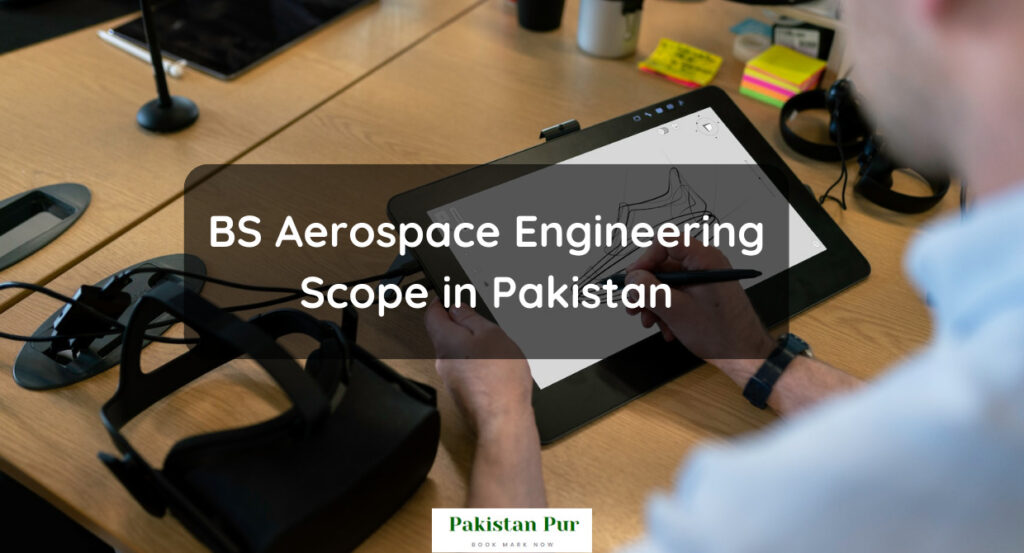
Table of Contents
The BS Aerospace Engineering Scope in Pakistan is slowly growing as the aviation and aerospace industry is growing at a very slow rate. However, you can secure your future abroad.
The field of Aerospace Engineering holds a promising future. With technological advancements and the rising interest in space exploration, the demand for Aerospace Engineers is on the rise globally.
In Pakistan, this discipline is still emerging but has the potential to contribute significantly to the country’s development.
The curriculum equips students with skills to design, develop, and test aircraft and spacecraft, making them competitive in the global market.
Moreover, the government’s focus on strengthening the aerospace sector could lead to increased opportunities for these professionals. Hence, BS Aerospace Engineering offers a solid career path with vast growth prospects.
Let’s dive deeper into the scope of BS aerospace engineering in Pakistan.
Industries for BS Aerospace Engineering in Pakistan
1. Aerospace Manufacturing: Aerospace engineers design and develop advanced aircraft and spacecraft, making this sector a natural fit.
2. Defense Industry: Engineers can contribute to the development of cutting-edge defense technologies, including drones and missiles.
3. Space Exploration: With organizations like NASA and SpaceX, there are opportunities in designing and building space vehicles.
4. Aviation: Commercial airlines employ aerospace engineers for the maintenance, innovation, and safety of their fleet.
5. Research and Development: Engineers often work in R&D, innovating new technologies for flight and space travel.
6. Government Agencies: Many government entities, such as the Pakistan Space & Upper Atmosphere Research Commission (SUPARCO), hire aerospace engineers.
7. Education: Universities and colleges need aerospace engineers as faculty members to teach the next generation.
8. Consultancy Services: Aerospace engineers offer expert advice on the design, safety, and efficiency of aircraft and spacecraft.
9. Energy Sector: The wind turbine sector employs aerospace engineers for their aerodynamic knowledge.
10. Software Development: With the increasing role of software in aviation and space exploration, there’s a demand for aerospace engineers in this field.
Read this guide to know about the universities offering BS aerospace engineering in Pakistan, subjects and courses, fee structure, admission criteria, and more.
Guide To BS Aerospace Engineering In Pakistan 2023
Careers for BS Aerospace Engineering
1. Aerospace Engineer: Responsible for designing, testing, and managing the production of aircraft, spacecraft, satellites.
2. Aircraft/Spacecraft Designer: Specializes in creating new concepts and designs for aviation and space vehicles.
3. Military Aerospace Engineer: Works on defense-related aeronautical technology, such as drones and missiles.
4. Drafter: Converts the designs of engineers into technical drawings and plans.
https://googleads.g.doubleclick.net/pagead/ads?client=ca-pub-8897779020371977&output=html&h=280&adk=486873897&adf=1085749446&pi=t.aa~a.2773900404~i.65~rp.4&w=870&fwrn=4&fwrnh=100&lmt=1697799434&num_ads=1&rafmt=1&armr=3&sem=mc&pwprc=4068689177&ad_type=text_image&format=870×280&url=https%3A%2F%2Fpakistanpur.com%2Fbs-aerospace-engineering-in-pakistan%2F&host=ca-host-pub-2644536267352236&fwr=0&pra=3&rh=200&rw=870&rpe=1&resp_fmts=3&wgl=1&fa=27&uach=WyJXaW5kb3dzIiwiMTAuMC4wIiwieDg2IiwiIiwiMTE4LjAuMjA4OC40NiIsW10sMCxudWxsLCI2NCIsW1siQ2hyb21pdW0iLCIxMTguMC41OTkzLjcxIl0sWyJNaWNyb3NvZnQgRWRnZSIsIjExOC4wLjIwODguNDYiXSxbIk5vdD1BP0JyYW5kIiwiOTkuMC4wLjAiXV0sMF0.&dt=1697799421942&bpp=27&bdt=5366&idt=27&shv=r20231011&mjsv=m202310170101&ptt=9&saldr=aa&abxe=1&cookie=ID%3D7eb0257bf975d8d4-224b4af942e000dd%3AT%3D1690535784%3ART%3D1697799299%3AS%3DALNI_Mb1gPylqwlAhGZ57ap4P0J6ZXruFg&gpic=UID%3D00000c7288ebdc64%3AT%3D1690535784%3ART%3D1697799299%3AS%3DALNI_MbCeUxAAY7zLS0ywZPk6lyo4MNh7g&prev_fmts=0x0%2C1200x280%2C870x280%2C1343x650%2C870x280%2C870x280&nras=7&correlator=8402205382876&frm=20&pv=1&ga_vid=1002434488.1689440920&ga_sid=1697799420&ga_hid=1414218470&ga_fc=1&u_tz=300&u_his=1&u_h=768&u_w=1366&u_ah=728&u_aw=1366&u_cd=24&u_sd=1&dmc=4&adx=87&ady=6202&biw=1343&bih=650&scr_x=0&scr_y=3636&eid=44759875%2C44759837%2C44759926%2C44804683%2C44805113%2C44805533%2C44805680%2C44805918%2C44805931%2C31078301%2C31078964&oid=2&pvsid=2594538597252170&tmod=1604255728&wsm=1&uas=3&nvt=1&ref=https%3A%2F%2Fpakistanpur.com%2Fpost-sitemap.xml&fc=1408&brdim=0%2C0%2C0%2C0%2C1366%2C0%2C1366%2C728%2C1358%2C650&vis=1&rsz=%7C%7Cs%7C&abl=NS&fu=128&bc=31&ifi=7&uci=a!7&btvi=4&fsb=1&xpc=97ZknZ8IoY&p=https%3A//pakistanpur.com&dtd=12938
5. Aerodynamic Engineer: Focuses on how air interacts with moving objects like aircraft5.
6. Aeronautical Engineer: Primarily deals with the design and technology of aircraft within the earth’s atmosphere.
7. Systems Engineer: Ensures all aspects of a project or system are considered and integrated.
8. Manufacturing Engineer: Oversees the process of turning raw materials into a finished product in the most efficient way.
9. Quality Manager: Ensures that the products produced meet certain set standards of quality.
10. Patent Attorney: Specializes in securing patents for original aerospace inventions and technologies.
BS Aerospace Engineering Freshers Salary
As per job boards, a fresher with a Bachelor’s degree in Aerospace Engineering can expect an average salary of around Rs 1,211,881 per year in Pakistan.
However, the exact pay scale may vary depending on factors such as the employer’s size, the industry, and the individual’s skills and qualifications.
This figure is comparable to the global trend where entry-level Aerospace Engineers in the USA earn an average salary of $81,102.
Consequently, BS Aerospace Engineering graduates in Pakistan can anticipate competitive starting salaries as they embark on their professional journeys.
Further Education after BS Aerospace Engineering
In the constantly evolving field of aerospace engineering, further education can significantly enhance your career prospects.
Here are some educational paths you might consider:
1. Master’s Degree in Aerospace Engineering: A master’s degree offers deeper knowledge and specialization in areas like propulsion, aerodynamics, or avionics. This advanced degree can make you more competitive in the job market and open up opportunities for roles with more responsibility and higher pay.
2. PhD in Aerospace Engineering: A doctorate is ideal if you’re interested in research or academia. With a PhD, you can contribute to groundbreaking research, teach at the university level, or even lead your own team of engineers.
3. MBA (Master of Business Administration): If you aspire to take on leadership or management roles within an engineering firm, an MBA could be beneficial. It will equip you with the business skills necessary to oversee projects, manage teams, and make strategic decisions.
4. Professional Engineering (PE) License: While not a degree, obtaining a PE license can boost your career. It demonstrates your commitment to the profession and allows you to sign off on engineering projects and serve as a consultant.
Remember, further education requires a significant investment of time and money, so it’s essential to consider your long-term career goals before deciding on the right path for you.
Leave a Reply